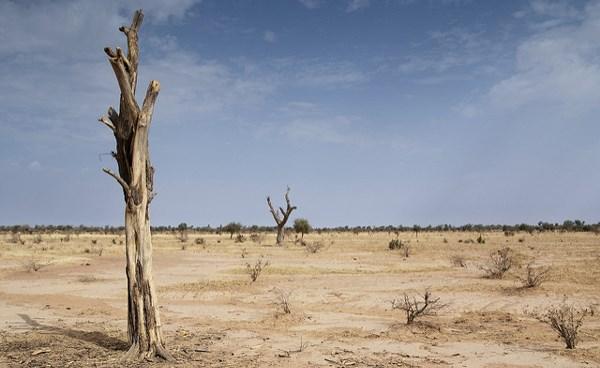 |
| Source: http://www.thinkingfaith.org/sites/default/files/styles/article_full_687/public/field/image/20170308_1desertification.jpg?itok=W-JoMYsU |
The Book of Genesis describes the protective Covenant between God and the people of Israel that would be symbolized by the rainbow.
* [9:8–17] God makes a covenant with Noah and his descendants and, remarkably, with all the animals who come out of the ark: never again shall the world be destroyed by flood. The sign of this solemn promise is the appearance of a rainbow.In the First Letter from Peter, Jesus, death in the flesh is our example for understanding new life in the Spirit.
* [3:18] Suffered: very many ancient manuscripts and versions read “died.” Put to death in the flesh: affirms that Jesus truly died as a human being. Brought to life in the spirit: that is, in the new and transformed existence freed from the limitations and weaknesses of natural human life (cf. 1 Cor 15:45).The brief description of Jesus temptation in the desert in the Gospel of Mark has a journalistic tone drawing us to seek more understanding beyond the headline.
* [1:12–13] The same Spirit who descended on Jesus in his baptism now drives him into the desert for forty days. The result is radical confrontation and temptation by Satan who attempts to frustrate the work of God. The presence of wild beasts may indicate the horror and danger of the desert regarded as the abode of demons or may reflect the paradise motif of harmony among all creatures; cf. Is 11:6–9. The presence of ministering angels to sustain Jesus recalls the angel who guided the Israelites in the desert in the first Exodus (Ex 14:19; 23:20) and the angel who supplied nourishment to Elijah in the wilderness (1 Kgs 19:5–7). The combined forces of good and evil were present to Jesus in the desert. His sustained obedience brings forth the new Israel of God there where Israel’s rebellion had brought death and alienation.Andy Alexander, S.J. ponders the sense that we may not be coming up with anything to think about or change in ourselves. He suggests that we might need to turn the dial up on the desert part of this Lent.
Going into the desert - stripping ourselves of all the noise and distractions (things that lean us or tend us in the opposite direction) - so that we can see more clearly, understand with greater focus, what we are really like - what we are really about. During Lent, we can see the fault lines, with our eye wide open. We can recognize where the battle for integrity really is, where the struggle for our best self is waged on a day to day basis. Each of us can give ourselves to concretely discovering the place where we teeter between doing what we know is right and good and loving, and responding selfishly, even with revenge and divisiveness. In the desert of Lent, those choice points become clearer and can result in our discovering riches Jesus is offering us in a life that is more whole and balanced, responsive to his grace, and full of self-sacrificing love.
Jaime Tatay SJ is a forest engineer and a Jesuit priest. He is the author of many articles on ecology, spirituality and Catholic Social Teaching. He writes that, during Lent, we are specially invited to imitate Jesus and go into the spiritual and natural wildernesses of our time for transformation and encounter with God. However, to accept this invitation we have to overcome several obstacles in our contemporary, noisy, hyper-connected, rapidly urbanising world.
Pope Francis, quoting Patriarch Bartholomew, seems to be pointing in this direction when he speaks ‘of the need for each of us to repent of the ways we have harmed the planet, for “inasmuch as we all generate small ecological damage”, we are called to acknowledge “our contribution, smaller or greater, to the disfigurement and destruction of creation”.’[vii]Friar Jude Winkler offers a description of the chaos of the flood as a consequence of the chaos of sin. The protection of God in a Covenant is to address our need. Mark’s description of Jesus in the desert is primitive. Perhaps Mark is pointing to later chapters showing temptation from human sources.
Fr. Richard Rohr, OFM, expresses the hope that our very suffering now, our crowded presence in this nest that we have largely fouled, will bring us together politically and religiously.
The Earth and its life systems, on which we all entirely depend, still have the potential to convert us to a universal maturity. We all breathe the same air and drink the same water. There are no Native, Hindu, Jewish, Christian, or Muslim versions of the universal elements. The periodic table is the same in every country, or as Shakespeare and musician Mandisa expressed it, we all bleed the same. Animals do not care whether they are on the Mexican or the American side of our delusional wall.The rainbow and the desert are spiritual symbols that stimulate meditation about understanding our relationship with God. The direct nudge from these images to seek communion with the full Creation that is the baseline Presence for all humanity.
References
(n.d.). Genesis, chapter 9 - United States Conference of Catholic Bishops. Retrieved February 18, 2018, from http://www.usccb.org/bible/genesis9:35
(n.d.). 1 Peter chapter 3- United States Conference of Catholic Bishops. Retrieved February 18, 2018, from http://www.usccb.org/bible/readings/bible/1Peter/3:18
(n.d.). Mark, chapter 1 - United States Conference of Catholic Bishops. Retrieved February 18, 2018, from http://www.usccb.org/bible/mk/1:3131
(n.d.). Online Ministries at Creighton University. Retrieved February 18, 2018, from http://onlineministries.creighton.edu/CollaborativeMinistry/
(2017, March 8). Desertification as a spiritual challenge | Thinking Faith: The online .... Retrieved February 18, 2018, from http://www.thinkingfaith.org/articles/desertification-spiritual-challenge
(2017, December 30). 2018 Daily Meditations - Center for Action and Contemplation. Retrieved February 18, 2018, from https://cac.org/2018-daily-meditations/
No comments:
Post a Comment